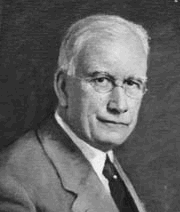 Robert E. Speer was born in 1867 in Huntingdon, Pennsylvania, a small town nestled in the Allegheny Mountains. His father, who raised the family alone after the death of Martha Speer in
1876. He passed on his religious tradition, in part, by requiring his children to memorize the Shorter and Larger Westminster Catechisms. Robert E. Speer was born in 1867 in Huntingdon, Pennsylvania, a small town nestled in the Allegheny Mountains. His father, who raised the family alone after the death of Martha Speer in
1876. He passed on his religious tradition, in part, by requiring his children to memorize the Shorter and Larger Westminster Catechisms.At age 16 Robert was sent east to Phillips Academy for a college preparatory education. He matriculated at the College of New Jersey (Princeton) in 1885. In college, Speer was profoundly influenced by Dwight L. Moody, the preeminent evangelist of the day, and committed himself to foreign missions. He matriculated at Princeton Seminary in 1890 but accepted a position with the Board of Foreign Missions of the Presbyterian Church in 1891 and never completed his theological degree. Speerís theology, nurtured in the crucible of the interdenominational Student Volunteer Movement and the budding international missionary movement, was broadly Christocentric. A passionate "apostle of Christian unity" he disparaged theological disputes between denominations and advocated the equality before God of men and women and of all races. Moreover, Speer insisted that Christ, as the revealer of the unity and equality of all people, bore the solution to inter-national struggle. The Christian faith offered the only basis of a "just and secure international order." Speer served on the Special Commission of 1925 and, as moderator of the 1927 General Assembly, presided over the adoption of the commissionís report that declared the fundamentals non-binding on the church. In this, his vision of a broad evangelical Christianity won the day over militant doctrinal precisionism, ensuring, Speer believed, the proclamation of the Gospel for the salvation of the world. In 1933 controversy reared its head again when Machen charged the Board of Foreign Missions, which Speer directed, with tolerating modernists. When the General Assembly vindicated the orthodoxy of the Board, Machen formed an Independent Board of Presbyterian Foreign Missions to promote "truly Biblical Mission work." Speer, of course, welcomed the General Assemblyís support but he lamented the division in the church, for the world family, which could only be one in Christ, could never be united by a divided church. |